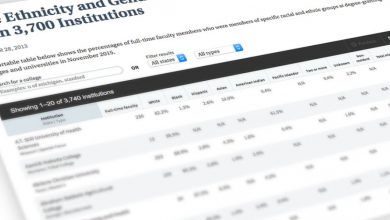Under Biden’s Education Dept., Sexual-Violence Investigations Drag On

For seven years, Sally Bourdon has waited for the Education Department’s Office for Civil Rights to do something.
Bourdon filed a federal complaint against Hamilton College in 2014, alleging that it had violated Title IX, the gender-equity law. In her complaint, shared with The Chronicle, Bourdon alleges that she was sexually assaulted by another student and that administrators at the New York college didn’t protect her from other students’ retaliation after she reported it.
Bourdon thought the department would help her seek justice after she felt she’d been harmed. “I didn’t want what happened to me to happen to anybody else,” she said. But more than six years after she graduated, the civil-rights office, known as OCR, still hasn’t resolved its investigation of her case. Hamilton College, Bourdon said, still hasn’t been held accountable.
As of last month, there were 243 active OCR investigations into sexual violence or sexual harassment on college campuses, according to an Education Department database. Nearly half of them — 108 — are at least five years old.
“This is not an acceptable way to enforce civil rights,” said Laura L. Dunn, a victim-rights lawyer who is representing Bourdon.
Meanwhile, three students who worked with Dunn to file Title IX complaints this year have waited months for the department to decide whether to even investigate their cases. The department’s manual states that such decisions are supposed to be made within 30 days.
According to the department database, nine sexual-violence investigations involving colleges were opened from January to October this year — a far smaller number than in recent years. In 2015, for instance, the Obama-era department opened 106 sexual-violence investigations. In 2017 the Trump-era department opened six sexual-violence investigations in a single week.
The department attributed the delay in processing cases to the change in presidential administrations. “Supporting students’ rights to be free from sex-based harassment, including sexual violence, remains a top priority in OCR,” said Catherine E. Lhamon, the assistant secretary for civil rights, in a statement provided by a department spokesperson. Lhamon, who held the same job from 2013 to 2017 and led a period of aggressive Title IX enforcement, was confirmed to the post last month after extensive scrutiny from lawmakers.
The Title IX backlog isn’t new. OCR has for years lacked the staff and resources to keep up with its caseload, especially as awareness of Title IX protections has grown.
But Dunn said she hadn’t expected the Biden administration — which has publicly vowed to fight for the rights of sexual-assault victims in schools and colleges — to move this slowly. She fears the pileup could quickly get worse. “That means survivors’ losing faith in the enforcement process, which is simply unacceptable,” she said.
The case delays raise two questions: Is the Biden administration fulfilling its promise to deliver justice to victims? And if Title IX investigations continue to take years, well beyond the typical tenure of a student on campus, is the Office for Civil Rights doing its job?
‘Even Worse’
Over the past decade, as the movement against campus sexual assault has gained steam, the department has fielded a growing number of Title IX complaints.
If the department investigates and finds a violation of Title IX, it has the power to strip a college’s federal funding. That’s never happened. Instead, the department has often sought to make examples out of colleges for mishandling sexual-assault cases. In recent years the department has drawn public attention to some of its resolution agreements, which require colleges to acknowledge mistakes, make policy changes, and submit to government monitoring.
But some of the department’s reviews have had extremely long timelines.
Bourdon said she was sexually assaulted by a fellow Hamilton College student in early 2013. The student she accused was suspended in the fall of 2013 after repeatedly violating a no-contact order, according to her federal complaint. But that suspension, she said, came only after months of harassment by the student, which made her experience on the small campus miserable.
She also faced retaliation from the student’s fellow fraternity members after she reported the assault, the complaint states, and administrators didn’t punish them or the fraternity. Fraternity members tried to discourage witnesses from testifying at Bourdon’s campus hearing, according to the complaint.
A spokeswoman for Hamilton College declined to comment.
When Bourdon filed her federal Title IX complaint, in 2014, she said she thought the investigation would take a year or two. She never imagined she’d still be thinking about her case seven years later. “How many other people is this happening to?” she asked.
Dunn also represents the complainant in a federal Title IX investigation of the University of Notre Dame that has remained open for six years, with no resolution in sight. A spokesman for Notre Dame declined to comment.
Amanda Walsh, a lawyer at the Victim Rights Law Center, said OCR hadn’t made progress on resolving any of her cases, either. She represents complainants in five federal Title IX investigations that are at least six years old.
The Chronicle also spoke with three students who filed federal complaints this year — against the University of Wisconsin at Madison, the University of Maryland at College Park, and Montgomery College, a two-year institution in Maryland. Their complaints sat for months, waiting for the civil-rights office to decide whether to open them for investigation. This month the office opened investigations against Montgomery College and the University of Maryland — five and eight months, respectively, after the complaints had been filed. The University of Wisconsin complaint, filed 10 months ago, remains in limbo.
In some ways it’s not surprising that OCR is moving slowly. Lhamon, the civil-rights chief, was confirmed by the Senate just last month.
The older investigations were opened during the Obama administration, when the department broadened the scope of OCR’s reviews — looking systemically at how a college had handled sexual-assault reports over several years. The systemic investigations take more time. Congress approved several budget increases for OCR, but that didn’t clear out the case backlog.
The Trump administration’s department, led by the former education secretary Betsy DeVos, criticized its predecessors for creating such a large backlog. Many victim advocates weren’t fans of DeVos, seeing her primarily as an ally of the accused, and criticized her for scaling back the scope of investigations. But there’s no question that her department closed out Title IX investigations more quickly.
More cases were administratively closed. Others were resolved through a mediation-like process that the college, the complainant, and OCR must all agree to. Mediation happens in lieu of a full investigation, and can help sexual-assault victims secure financial compensation or policy changes more quickly, Dunn said.
A department spokesperson didn’t answer questions about how many Title IX complaints had been filed during President Biden’s tenure so far, compared with other years. But Howard Kallem, who spent 20 years as a lawyer in the civil-rights office, said there was typically an uptick in civil-rights complaints when a Republican administration changed to a Democratic one.
Kallem, formerly the director of Title IX compliance at Duke University, is now a lawyer in private practice. He said he has several pending Title IX complaints that are more than two years old.
From what Kallem has seen, “the workload was already overwhelming before the change in administration,” he wrote in an email. “If there was an increase this year, it would have made it even worse.”
Survivors Are ‘Disenchanted’
Many students and victim advocates see the federal-investigation process as a crucial mechanism for forcing colleges to take sexual violence seriously. Some accused students have also turned to OCR for help when they feel as if they’ve been treated unfairly. College administrators often lament that the investigations are burdensome and lead to years of negative attention based largely on allegations.
But if investigations are routinely dragging on for six or seven years, that’s not an effective process, Walsh said. “At this point, we don’t even really view OCR as a viable option for most of our clients because we know that they’ll never see a resolution that will impact them,” she said. College students are probably better off filing lawsuits, which are expensive, or turning to the news media for accountability, she said.
In the seven- or eight-year time frame of some of her cases, Walsh said, campus policies have already changed several times since the original complaint was filed. And the student has long since left campus. So, she asked, what remedies can the Education Department even offer?
The long wait, Dunn said, “really has left a lot of survivors feeling disenchanted, as though no system will ever work for them.”
Some victim advocates are also frustrated that Biden’s Education Department has taken so long to revise the Trump-era Title IX regulations, which they see as harmful to survivors. The department held a public hearing on Title IX this year but doesn’t plan to issue proposed changes in the rules until 2022.
Last month, victim-advocacy groups held a rally outside the department’s headquarters and delivered a petition with more than 50,000 signatures calling for action. The groups demanded that the department stop enforcing aspects of the regulations “that limit survivors’ access to resources and support.” The groups also urged the department to “ensure that survivors can file complaints with the Office for Civil Rights when their rights are violated by their school immediately.”
If not the Education Department, said Shiwali Patel, director of justice for student survivors at the National Women’s Law Center, “who is going to hold schools accountable?”
Bourdon filed her federal complaint because she wanted to create change at Hamilton. She doesn’t regret coming forward to OCR because she wants to make sure other students have the protections she says she didn’t have. But now she’s living out of the country and just wants to move on with her life.
“Every time I see an email from Laura, or I see an email where the OCR is copied, I get this surge of panic, and I freeze,” Bourdon said. In those moments, she feels as if she’s a student again.
“I’m back on this college campus feeling so tiny and inconsequential,” she said. “I feel like I’m trapped there still. And I don’t want to be anymore.”
Source link






